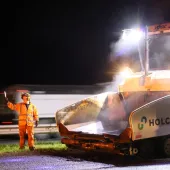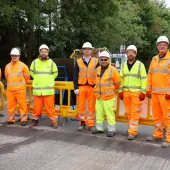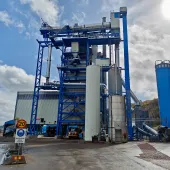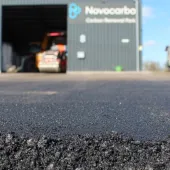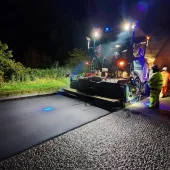Moving Into A New ERA
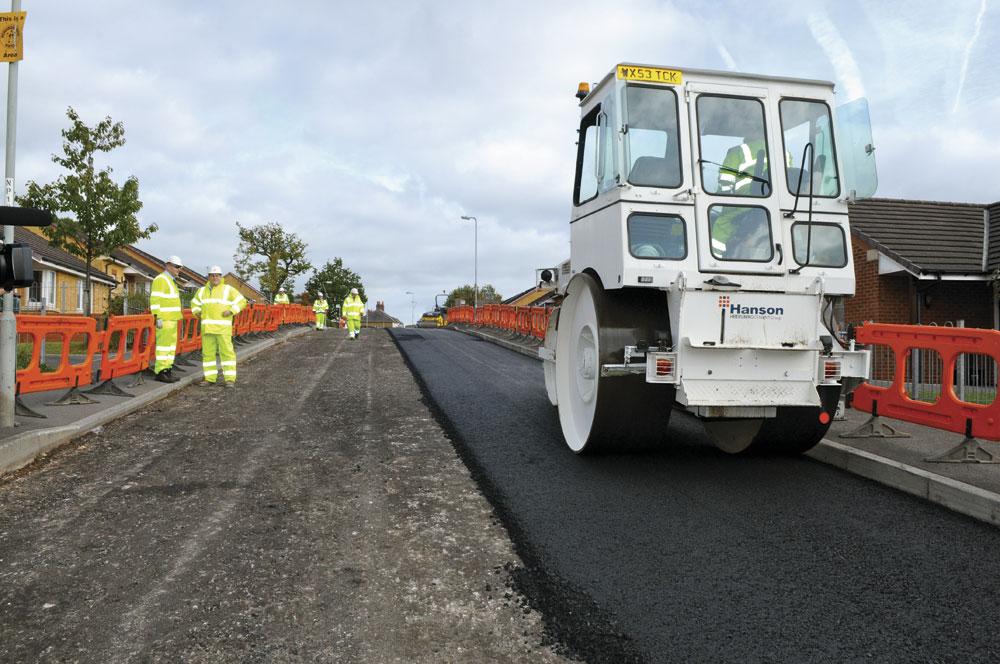
In April 2010 Hanson became the first company in the UK to produce and lay low-energy asphalt, and eight months later launched their own production process, Hanson ERA, which reduces carbon emissions by up to 50%. So, one year on, has ERA lived up to expectations?
The launch of Hanson ERA was the result of a 10-year project to evaluate the different technologies available to reduce the energy required to produce asphalt and incorporate more recycled content. This was part of Hanson’s overall commitment to deliver a more sustainable asphalt solution, which was becoming a regular demand from the company’s customers.
Traditionally, hot-mix asphalt (HMA) has been the preferred construction method for most roads in the UK as it offers flexibility, stiffness and resistance to deformation. But it is an energy-intensive process, with production temperatures of up to 190°C, and uses virgin material, which has made producers consider alternatives such as warm mix, semi-warm mix and cold mix.
Warm-mix technologies tend to provide materials that look like hot-mix but with improved workability at lower temperatures. They necessitate the use of additives or modified binders, which increase the cost of the product for a relatively small reduction in temperature – and hence deliver a relatively low carbon saving. Cold mixes provide a flexible surface but require a period of curing to achieve full stiffness. They do not generally look or perform like HMA and, therefore, are not widely used in the UK.
Having ruled out these two technologies, Hanson’s focus turned to semi-warm mix technology, based on the existing and proven process which has been used in Europe and the US for more than five years.
The result is Hanson ERA, which uses micro-foaming of the bitumen film in the asphalt plant mixer to give workability. The process is applicable to approximately 90% of the company’s product portfolio – base, binder and surface-course materials – and offers far greater carbon savings compared with HMA, with no loss of performance.
Hanson ERA is produced at temperatures between 90–95°C, offering up to a 50% reduction in CO2 emissions compared with equivalent HMA, and can contain up to 50% recycled content, while enhancing durability and health and safety for contractors.
In addition, the lower temperature allows faster completion of resurfacing works, minimizing time on site for contractors and disruption for motorists. This was demonstrated through trials with Newport City Council where 110 tonnes of ERA HDM binder course containing 20% recycled content was used to resurface two lanes of a busy bus route.
Laying began at 1pm and the road was compacted and re-opened to traffic within 2h. Tests have shown that the asphalt achieved HA Level 2 deformation resistance as well as saving 1.21 tonnes of CO2 emissions on the contract – equivalent to driving a standard family saloon car from London to Los Angeles.
Over the past 12 months, Hanson have successfully applied the ERA process to a wide range of products, including CE-marked asphalt concrete base, binder and surface courses; a fibre-modified surface course; HRA binder courses; and even a polymer-modified thin-surface-course system. In addition, Hanson became the first company to successfully lay semi-warm stone-mastic asphalt (SMA) in the UK through their trial with Cambridgeshire County Council, where the ERA process was used to produce and lay 150 tonnes of 14mm SMA on the B645 at Great Staughton.
At present, seven of the company’s 35 asphalt plants have been modified to incorporate the ERA process, providing nationwide coverage, and more are being brought on stream as part of Hanson’s commitment to continuous carbon reduction.
Around 50% of Hanson’s asphalt units are within quarries, minimizing the distance the constituent materials have to travel, and the ERA process allows an increase in the recycled content as super-heating of virgin aggregate is not required, thus helping to conserve natural resources. The asphalt produced using the ERA process is also 100% recyclable, preventing any waste going to landfill.
The waste and energy savings achieved using the ERA process are demonstrated in Hanson’s on-going partnership with Merthyr Tydfil County Borough Council.
Here, the company is helping the local authority recycle and reuse its worn road-surfacing materials by processing and using them as part of the recycled content of its ERA asphalt. In Merthyr Tydfil, Hanson produced 400 tonnes of AC14 close-graded ERA surface course with a 22.5% recycled content. The technology reduced CO2 emissions by more than 5.5 tonnes and recycled 90 tonnes of asphalt planings from the council’s roads.
Hanson are continually monitoring the results from the road trials and projects they carry out to update and assess their data. When considering the embedded carbon savings of asphalt produced using the ERA process, for example, the company uses the Highways Agency’s asPECT tool. This looks at the carbon associated with the delivery of all raw materials to the site as well as the energy used in its manufacture. Due to the way that ERA asphalt is produced – as well as its increased recycled content – the process offers embedded carbon reductions in excess of 25% compared with equivalent HMA.
The past year has shown that the Hanson ERA process offers tangible benefits for producers, contractors and clients alike, and provides a highly effective solution for local authorities, the Highways Agency and approved contractors looking to increase efficiency, reduce costs and meet sustainability targets.
It has taken a while for the concept to be accepted, because ERA contradicts the long-established belief that hot-mix is the preferred method of construction and that water and bitumen should not be mixed together due to the volatility of their relationship, which is obviously not the case.
However, once contractors and clients have become familiar with the benefits of the ERA semi-warm mix process, and how the addition of water can produce controlled foaming of the bitumen in the mixer box, they have been very keen to talk to the company.
Moving forward, Hanson say they are looking to bring more of their plants on stream to be able to use the ERA production process and will continue to work in the laboratory on material combinations and trials to ensure that they continue to offer the most innovative and sustainable asphalt in the market.
For further information visit: www.hanson.co.uk


